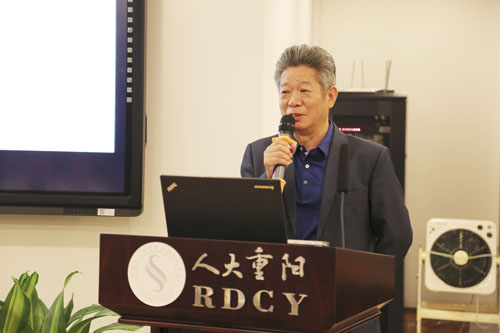Picture
Your Present Location: HOME> PictureTrade friction reflects disintegration of neoliberal order——Wen Yang lecture held in RDCY
On September 27th, the 127th lecture of Chongyang Institute for Financial Studies at Renmin University of China (RDCY) was held in Beijing, inviting Wen Yang, a senior fellow of RDCY and a researcher of China Institute at Fudan University, to deliver a speech on the history and future trend of China, and give an analysis on the future destiny of China against the backdrop of Sino-US trade friction.

Wen said that the trade friction between China and the United States can be considered as the disintegration of the neoliberal global order. He noted that the trade friction should not be completely limited to the relationship between China and the US. Starting from the 1960s and 1970s, a neoliberal revolution swept over the world. However, with US President Donald Trump coming to power and Brexit, This order is facing disintegration and is reflected in the form of Sino-US trade disputes.
What kind of situation will the world be after the disintegration of the neoliberal order? Will there be a new order? Wen Yang said that the overall situation is that with the collapse of the current order, global uncertainty is emerging. If defending the principles such as multilateralism in the trade friction, China will play a more important role in the future order.
During the period of great changes in the world, we should tap into the complicate phenomena from the origin of the civilization, which must be a process that moves forward continually, Wen said. There have been more than 650 primitive societies in human history, most of which have not developed into a civilization, and only 26 can be called civilization in the long history. By the end of the 8th century, there were five major societies in the world: Western society, Islamic society, Orthodox society, Indian society and Far Eastern society, Wen added.
"Today, we are witnessing the emergence of a global civilization," Wen Yang said. "No matter which big city you go in the world, you will find that there is no obstacle to living. This is totally unimaginable a hundred years ago".
However, with the development of the new global civilization, frictions have arisen among the countries. Because the global village is too crowded. The more homogenized of the countries, the more they will trace the differences between their own civilization and other civilizations from the perspective of history.























































































 京公网安备 11010802037854号
京公网安备 11010802037854号





